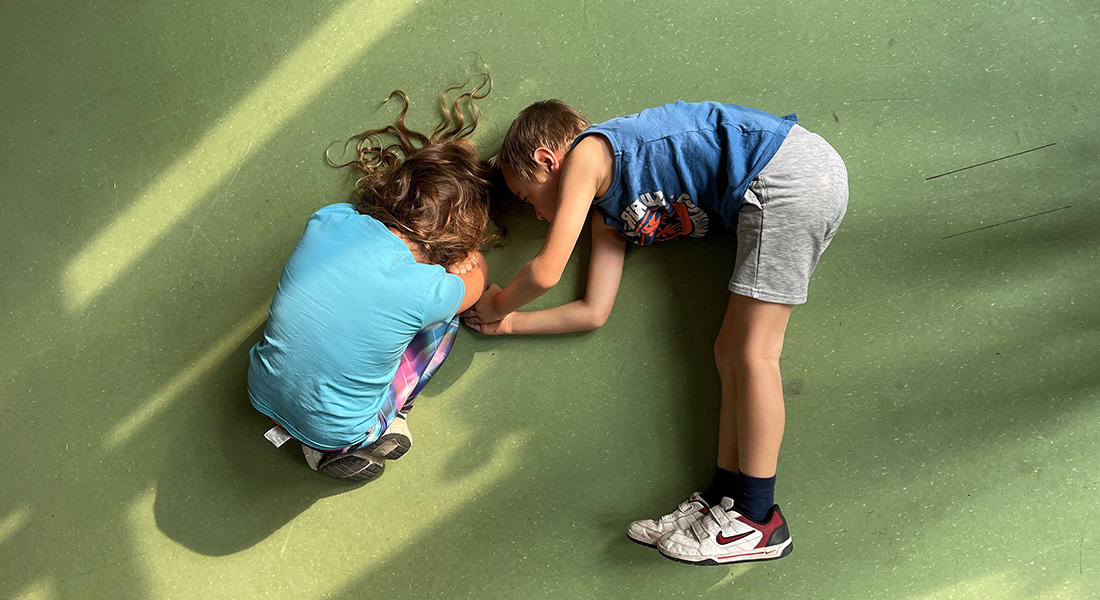Children’s spelling skills improve when teaching integrates movement
A new study from the University of Copenhagen’s Department of Nutrition, Exercise and Sports shows that children who use their bodies to 'shape' letter-sounds improve their spelling skills more than those who receive traditional classroom instruction. The learning strategy works for children with normal literacy development, as well for those who are at risk of experiencing reading difficulties.

The development of literacy skills is an important aspect of a child’s earliest years of school. This learning usually takes place while seated, which can be difficult for some children. And when a child falls behind in reading, they risk lagging behind throughout their school years. Now, a new study from the University of Copenhagen shows how a teaching method that integrates movement and phonics can accelerate children's knowledge of letter-sounds and spelling performance.
Major improvements in spelling and pre-reading
After only four weeks of three 25-minute interventions each week with movement phonemes – teaching that focuses on letter-sound couplings with the use of the body – 1st grade children doubled their scores in both spelling and letter recognition tests. These improvements were significant compared to the group of children who received regular classroom instruction.
The results are noteworthy. Not just because this method, known as “embodied learning”, can pay off in a relatively short amount of time, but also because the improvements are observable in both children at risk of literacy difficulties and those with regular literacy development. It all came as a surprise to PhD Linn Damsgaard, whose doctoral dissertation covered this research project at the Department of Nutrition, Exercise and Sports:
"The results suggest that embodied learning activities can significantly improve early literacy and spelling performance in children. We expected to see the greatest improvement in children with lower reading skills. But it turned out that children with normal reading levels experienced similar improvements. It is gratifying that children at every level experienced significant improvement in their skills, regardless of their baseline," says Linn Damsgaard.
Even though the children improved at letter recognition and spelling individual words, no significant improvement in their reading ability was observed. According to Linn Damsgaard, there might be a natural explanation: "Our intervention at the school was relatively short, and there is a difference between recognizing an individual letter and reading an entire word. So, we think any lack of an impact on children's overall reading abilities is likely because the children had simply not gotten there yet in their literacy development. Had we been with the children for a longer period of time, we would probably have seen an effect on literacy later on in the school year," says Damsgaard.
The study was conducted in collaboration with Anne-Mette Veber Nielsen, PhD from the Danish National Centre for Reading. Nielsen sees potential in the results and hopes they can form a basis for delving more deeply into the connection between movement and learning – especially for the benefit of those children who are at risk of reading difficulties: "The results help to substantiate how effective systematic training in linking letters and their different pronunciations is for early literacy. I hope that future studies can help shed light on why embodied learning is the reason why children at risk of written language difficulties also experience such remarkable progress in just five hours of instruction."
Early skills development leads to better schooling
The study emphasizes the value of integrating movement into teaching and Associate Professor Jacob Wienecke from the Department of Nutrition, Exercise and Sports is pleased that relatively little effort can provide students of all skill levels with a foundation that will help them do better in school:
"As numerous studies have pointed out, children's spelling and literacy skills in their early years of schooling are an indicator of success later on in their education. This makes getting off to a good start critical. Here, we see how the use of movement in instruction can give primary school students a significant boost very early in the learning process. Our hope is that, in the long term, this will be reflected in the way people think about literacy development in primary schools. Especially in light of the current proposal from the Ministry of Children and Education, which intends to remove the movement requirement in primary and middle schools."
Through the ACTIVE SCHOOL project, researchers are continuing their work to investigate other forms of embodied learning and how memory and learning processes can be improved through movement. The goal is to generate knowledge that can help educators, school leaders and students strengthen learning, well-being, motivation and physical and mental health through physical activity.
About the study
The study is a collaboration with the Danish National Centre for Reading. Fifty-seven first graders from Copenhagen’s Nørrebro Park School participated in the study. One group of children received regular spelling ad reading instruction, while the other group received instruction that focused on letter-sound couplings with the use of the body. Both groups included children with lower and higher reading abilities. The children were tested in spelling, letter-sound knowledge and word reading before and after the intervention.
The results of the study are published in the article Embodied Learning Activities Focusing on Letter-Sound Knowledge Increase Spelling Performance in 1st Grade Children with Low and High Reading Ability in the scientific journal 'Educational Psychology Review'.
Watch a video about the study (Danish)
Contact
Lektor Jacob Wienecke
Institut for Idræt og Ernæring
Københavns Universitet
Mail: wienecke@nexs.ku.dk
Telefon: 2443 3590
Adam Heede-Andersen
Kommunikationsmedarbejder
Institut for Idræt og Ernæring,
Københavns Universitet
Mail: aheede@nexs.ku.dk
Telefon: 31 14 06 99
